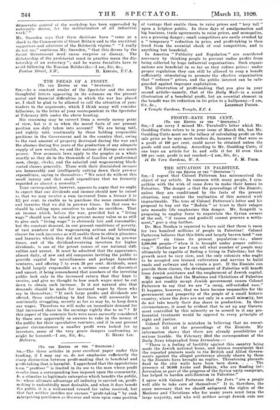THE DREAD OF A PROFIT.
[To THE EDITOR OF THE " SPECTATOR.] Sia,—As a constant reader of the Spectator and the many thoughtful letters appearing in its columns on the present moral and financial difficulties in which the war has placed us, I shall be glad to be allowed to call the attention of your readers to the arguments, which I think many will consider fallacious, in the letter of your correspondent in the Spectator of February 28th under the above heading.
His reasoning may be correct from a merely money point of view, but is it so when the moral facts of our present position are duly taken into account? We are being told, and rightly told, continually by those holding responsible positions in the Government and in the country that, owing to the vast amount of property destroyed during the war and the absence during five years of the production of any adequate supply of new wealth, we and the nations of Europe are much poorer. Now economic laws apply to the peoples as a whole exactly as they do to the thousands of families of professional men, clergy, clerks, and the salaried and wage-earning black- coated classes generally. These with their diminished incomes are honourably and intelligently cutting down their pre-war expenditure, saying to themselves : ' We must do without this small luxury and that small expenditure that we formerly regarded as almost a necessity."
Your correspondent, however, appears to argue that we ought to expect that our dividends and income should now be raised so that we may receive a sum increased from a former 5 to 121 per cent. to enable us to purchase the same commodities and luxuries that we did in pre-war times. In that case we should be calling upon ourselves to make no sacrifices. That an income which, before the war, provided but a " living wage" should now be raised in present money value so as still to give such "living wage" is obviously fair and reasonable; but the constant demand, in our present conditions of poverty, of vast numbers of the wage-earning artisan and labouring classes for such increases as will enable them to obtain pleasures and luxuries which they did not think of having in pre-war tunes, and of the dividend-receiving investors for higher dividends, is one of the potent causes of our national diffi- culties and unrest. It must be admitted that the appearance, almost daily, of new and old companies inviting the public to provide capital for miscellaneous and perhaps hazardous ventures, and offering 7 to even 20 per cent. dividends, must be held largely responsible as a serious cause of discontent and unrest, it being remembered that numbers of the investing public look only to the increased return that they hope to receive, and give no thought to how much wages must be cut down to obtain such increase. Is it not natural also that demands should be made for increased wages by those who say to themselves: " If such large profits and dividends are offered, those undertaking to find them will necessarily be continually struggling, secretly as far as may be, to keep down our wages. Therefore we will make an immediate demand for that increased share in the earnings rightly due to us " ? If this aspect of the economic facts were more earnestly considered by those now apparently so anxious to rake in the money of the public for their speculative ventures, and if in our present poorer circumstances a smaller profit were looked- for by investors, some of the very grave dangers confronting us might be lessened.—I am, Sir, &c., E. HENRY LEE. Malvern.










































 Previous page
Previous page